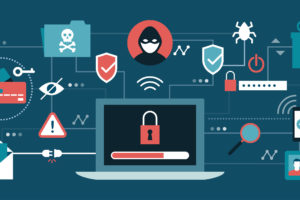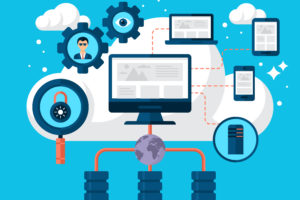As more devices join the Internet of Things, cybersecurity plays an increasingly important role in protecting our privacy, information, and even our physical safety. With cyberattacks increasing, data breaches involving leaked information growing, and hackers taking aim at state-level agencies — it’s never been more important to be aware of cybersecurity threats.
1) Artificial intelligence (AI)
Artificial Intelligence is at the forefront of developing technology. AI allows organizations to remotely inspect, hack into, and find weaknesses in online services. AI plays a huge role in cybersecurity — it allows for automated detection of suspicious patterns that foretell a cyberattack. However, AI can also allow hackers to disguise those same patterns by evaluating the AI program that’s tracking potential attacks.
And, while AI is being researched and deployed by the US government and military, it is also being deployed by criminal agencies and foreign interests. Countering these potential attacks takes a lot of resources and know-how.
2) Disinformation Campaigns and Voting Hacking
With the presidential race heating up in 2020, experts have already expressed concerns about the role technology will play in the election. In some ways, technology has been a good thing — voters are able to discuss and research candidates online, and form online groups with like-minded individuals.
Still, some of the biggest concerns stem from disinformation campaigns. Disinformation campaigns, or “fake news,” are campaigns that spread slander or are used to slur a candidate, typically via social media. Due to the shocking nature of these campaigns, they often go viral, and are organically shared by many people. Few people fact-check information they find online; what’s more, it can be difficult to fact-check when more than one source claims the same thing.
In addition to online disinformation, experts predict that there will be direct attacks against candidates themselves. Candidates could find themselves the source of data leaks. Opponents may hack websites and send them offline. And, perhaps most feared, the vote itself could be hacked — it has been stated that foreign interests may have attempted to control the last election.
3. Vehicle Hacking and Data Theft
Vehicles today have made a ton of advances. Outfitted with GPS data, sensors, entertainment and other metrics, modern cars are a valuable target for hackers and thieves. What’s more, most car companies haven’t begun outfitting cars with cybersecurity measures. And, without software updates, many older cars will be left vulnerable.
If your car is connected to your email address or Google account, criminals may be able to use your car to access other IoT devices in your home, like your Alexa or Nest. Since these devices also collect your information, it’s possible that criminals will be able to access many different aspects of your personal life, ranging from your full name to your banking information.
Don’t leave your business defenseless. Call Vodigy today for help with your business’s cybersecurity! We specialize in helping small and medium-sized businesses harness technology for their needs.




